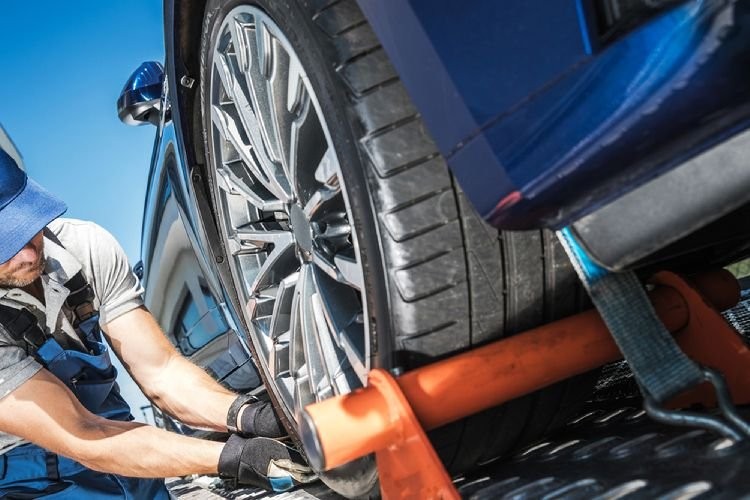Car repossession is a serious issue that many car owners face when they fall behind on their auto loan payments. Recovery agents, often referred to as “repo men,” are skilled at locating and repossessing vehicles. While you might think hiding your car prevents repossession, it’s essential to understand what happens if the repo man can’t find your car. Successfully concealing your vehicle doesn’t mean you’ve resolved the issue with your lender; in fact, it can lead to more significant and complex problems.
Let’s delve into the potential consequences and explore why hiding your car from repossession is generally not a wise strategy.
The Reality of Hiding Your Car from Repossession
Once you’ve defaulted on your car loan, the repossession process can begin swiftly. Repo companies are authorized to take your vehicle from various locations – your driveway, workplace parking, or even a public parking lot while you’re shopping. Typically, these companies will actively search for your vehicle for around 30 days. It’s crucial to be aware that in many cases, lenders can initiate repossession shortly after a single missed payment, and often without prior warning. To understand the specific regulations in your area, researching your state’s repossession laws online is advisable.
One tactic some borrowers consider is storing their car in a locked garage. Legally, a repo agent cannot enter a locked garage or breach a closed gate to access your vehicle, as this is considered a “breach of peace.”
However, while a locked garage might temporarily deter a repossession agent, other common strategies like removing license plates, parking the car down the street, or storing it at a friend’s house are usually ineffective in the long run. Repossession companies are experienced in overcoming these avoidance techniques.
Legal and Financial Repercussions When Hiding Fails
Even if you manage to initially hide your car, it’s unlikely to be a permanent solution. Lenders are persistent and have legal avenues to pursue if the repo company is unsuccessful in locating the vehicle.
When a repo company can’t find your car, they inform the lender of their unsuccessful efforts. At this point, the lender is likely to escalate the matter and pursue legal action against you. This often involves taking you to court to obtain a court order, known as a replevin, which compels you to return the vehicle. Ignoring a replevin order and refusing to surrender the car can lead to serious charges, potentially including vehicle theft, adding criminal penalties to your financial woes.
Furthermore, attempting to hide your car can actually increase your financial burden. The longer the repossession company searches, the more fees and expenses the lender incurs, and these costs are often passed on to you. If the lender proceeds with a court case, you’ll also be responsible for additional legal and court-related fees.
Understanding the Replevin Process
It’s important to differentiate between standard repossession and the replevin process. While standard repossession in many states doesn’t require prior notification, a replevin is a legal procedure that mandates lender notification and provides you with the right to a court hearing to dispute the repossession.
However, if you are indeed in default on your auto loan agreement – which is the basis for repossession – and especially if you have been actively hiding the vehicle, the lender is highly likely to win the replevin case. The court will then issue an order requiring you to surrender the car.
Beyond the loss of your vehicle, the financial consequences persist. You will still be liable for the costs associated with hiring the repossession company, as well as any vehicle storage fees incurred from the time the car is repossessed until it’s sold at auction. After the vehicle is sold, the proceeds are applied to your outstanding loan balance. However, in most cases, the auction sale price is less than the remaining loan amount, leaving you responsible for the deficiency balance – the difference between what you owed and what the car sold for.
How Repo Companies Can Escalate to Legal Means
If hiding your car prevents peaceful repossession – meaning the repo agent cannot take the car without force or legal order – your lender is likely to seek legal intervention. This can take the form of a replevin order or a monetary judgment.
A replevin, as mentioned, is a lawsuit where the creditor seeks a court order to force you to surrender the vehicle. A monetary judgment, on the other hand, is a court determination of the total amount you owe on the auto loan, including outstanding balance and any accrued fees.
You are legally entitled to written notification of the lender’s intent to pursue a replevin order. This notice must include details of your right to a hearing, including the location, date, and time, and your opportunity to dispute the lender’s claim.
State laws vary regarding the timeframe you have to respond to a replevin complaint and request a hearing. It’s critical to research your state’s specific replevin laws and consult with a legal professional for guidance if you are facing this situation.
Ignoring a replevin order is a serious mistake. Failure to comply and refusing to turn over the vehicle can result in both civil and potentially criminal penalties, depending on your jurisdiction.
Proactive Steps: Preventing Repossession in the First Place
If you’re concerned about potential car repossession, the most effective approach is to be proactive and communicate with your lender. Instead of trying to hide your car, reach out to them as soon as you anticipate difficulty making payments.
Explain your situation honestly and inquire about potential assistance programs. Many lenders are willing to work with borrowers to avoid repossession, as it’s a costly and time-consuming process for them as well. Possible solutions they might offer include:
- Payment Deferral or Extension: Some lenders may allow you to skip a payment and add it to the end of your loan term or spread it over subsequent months.
-
Loan Refinancing: Refinancing involves replacing your current loan with a new one, ideally with more favorable terms, such as a lower interest rate or extended loan term. This can significantly reduce your monthly payments, making them more manageable. However, refinancing typically requires a reasonably good credit score and some existing loan history.
-
Loan Modification: In some cases, lenders may agree to modify the terms of your existing loan, such as reducing the interest rate or extending the loan term, to lower your monthly payments.
Even if your lender can’t offer immediate solutions, initiating communication and demonstrating your willingness to cooperate can improve your standing and increase the chances of finding a workable solution. Lenders appreciate borrowers who are upfront and proactive in addressing financial difficulties.
The Importance of Open Communication
Avoiding lender contact and hiding your car will likely worsen the situation. Ignoring calls and notices from your lender can damage your relationship and make them less inclined to offer assistance. Contact your lender at the first sign of financial strain or as soon as you foresee missing a car payment. Open and honest communication is crucial in navigating financial challenges and finding solutions to prevent vehicle repossession.
Exploring Options Beyond Deferment
If you’re already facing repossession, you may still have options to regain control of the situation. Generally, three primary options exist:
-
Loan Reinstatement: This involves paying all past-due payments, late fees, and repossession costs in a lump sum to bring your loan current and stop the repossession process.
-
Loan Redemption: Redemption requires paying off the entire outstanding loan balance, including all associated fees and costs. This is typically an option if your car has already been repossessed and you want to get it back.
-
Vehicle Surrender: If reinstatement or redemption are not feasible, voluntarily surrendering your vehicle might be the most practical course of action. Surrendering the car can save you from accruing further repossession fees and allows you to return the vehicle on your own terms.
In conclusion, while the idea of hiding your car from the repo man might seem like a temporary solution, it ultimately leads to more complex legal and financial problems. Open communication with your lender and proactive exploration of available options are far more effective strategies for preventing vehicle repossession and managing financial difficulties. Remember, lenders often prefer to work with borrowers to find solutions rather than resorting to repossession, and taking the initiative to communicate is the first step toward a more favorable outcome.
By Meghan Carbary
Senior Automotive Financing Editor


